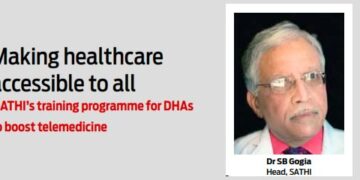Harvinder Ahuja
The health sector in the country is evolving and the Government under Prime Minister Narendra Modi is working hard to make medical services accessible to all. Towards that end, it came up with telemedicine practice guidelines in March 2020 and on Independence Day the same year, PM Modi announced the National Digital Health Mission (NDHM).
Under NDHM, health ID cards – carrying details of every test, every disease, doctors visited, the diagnosis and the medicines taken – are to be given to every citizen. The information is vital as it is portable and accessible even if the patient shifts to a new place and visits a new doctor. Till now, over 40 crore Ayushman Bharat Health Account (ABHA) IDs have been created and doctors are being given incentives to link their patient records with ABHA ID.
EHR vital component
“An important component for better adoption of telemedicine is having an EHR (Electronic Health Record) system. Also, EHRs help doctors for longterm care efficiency, management of chronic diseases, team approach, research public health as well as health strategy,” says Dr SB Gogia, head of the Society for Administration of Telemedicine and Healthcare Informatics (SATHI), a non-profit organisation.
The use of EHRs, he says, requires some training and understanding, which, unfortunately, is still not taught in medical schools. Some clinics may have helpers, receptionists, dressers, where many are multitasking. However, nurses do not file core EMR components like history and investigation reports, while a technical operator will not be able to attend to a patient.
“Shortage of trained manpower is affecting the growth of EHR as well as adoption of telemedicine. A huge untapped demand for such grassroot level health workers exists and can be tapped at the school level. It can hone skills, and, in turn, help build a career in healthcare,” says Dr Gogia, a top surgeon from AIIMS, New Delhi.
The manpower gap
To cover the manpower gap, SATHI recently launched a Digital Health Assistant (DHA) training programme wherein school passouts are selected and trained for six months with the following possible outcomes:
Jobs at existing local health and dental clinics as medically trained help
Jobs as emergency medical technicians
Performing life support and first-aid during accidents and emergencies
Starting own telehealth-supported centers in extremely remote areas The first batch (November last year) of these passouts is gainfully employed and the second batch is underway, Dr Gogia informed Blitz India. The induction ceremony of the third batch was held on March 4 in the presence of Dr Arvind Virmani, head of the National Skill Council at Niti Aayog.
SATHI has a successful track record of community health and telehealth projects with Prof Sneh Bhargava, former Director of AIIMS and current Director of Sitaram Bhartia Institute, as its chief patron and mentor. The basis of SATHI’s success lies in its firm belief that no technology can work without direct engagement and creation of capacity within the community where it is to be deployed.
















